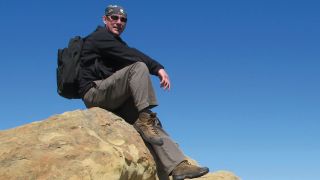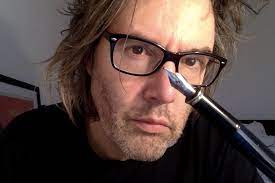With Rush mulling over their future plans, Neil Peart gives one of his most personal and revealing interviews ever, discussing himself, his passions and his thoughts on Rush’s future. Phil Wilding is all ears…
The low clouds and mist have only just burned off as the Los Angeles sun struggles to assert itself along the Santa Monica coastline. The air still smells like rain and Neil Peart is just back inside from admiring the garden. The house is still quiet – like most days, he’s the first to rise – and as we talk the intercom occasionally buzzes into life to check which part of the house Neil’s in. His office, as it turns out. Neil’s on the author trail, his new book, Far And Near: On Days Like These – a companion volume to 2011’s well-received travelogue memoir, Far And Away: A Prize Every Time – is on the stands. There’s also the matter of the day job as drummer and lyricist in Rush – stories and reflections from their Time Machine and Clockwork Angels tours make up the bulk of the book – and life as a dad the second time around. For someone so infamously guarded (he did write the lyrics to Limelight, after all) he’s surprisingly open about his daughter, five year old Olivia, and the life he lives now out in California. Constantly restless and consumed by wanderlust he may be, but Neil Peart sounds like a man who’s found home.
How’s California this morning?
It’s very good, we’ve had a bit of rain and so it all feels better.
This latest book seems more reflective than the first volume…
I suppose it’s all about me as an audience. More and more I realise that’s my presence in the world; I like to observe, especially in a moving vehicle and on the motorcycle, the world comes towards you like a show and I’m very tuned into that. A writing exercise that I always do, is that whatever I’m looking at, I think, how would I put this in words? A lot of Ghost Rider was written directly to a friend of mine who happened to be temporarily incarcerated at the time, so I was always looking at the world around me and discussing my feelings with myself in terms of a letter to him. That’s very much the character of the book; I describe the writing as being a series of different letters to someone.
The new book reflects Ghost Rider in tone: it’s a very honest, almost exposed read in some parts.
I do try and talk about my grief and what happened to me in the book because it helps people. Ghost Rider is by far my most widely read book and that kind of puzzles me, because the others are an awful lot happier to read, but there are certain people who have endured the same kind of experiences and loss as I have and found it helpful, so I do make the effort to share. I try to share those things to try and help people know they’re not alone, because it helped me to know that I wasn’t alone then.
You first started cycling while on tour in Utah in the mid-80s. What spurred that decision?
That was just a day off on tour and I thought, what can I do? I know, I’ll get a bicycle! And that was the beginning of the two-wheeled world for me.
Most people would have just gone to the bar.
I can divide my touring life into two phases because I realised on the very first tour in 1974 that this was no kind of life, and there was much hanging out time and it was potentially so self-destructive. And I started reading then, I filled all the empty hours with the education that I missed, delving into all the genres. There was the book period and then in my thirties I got into bicycling and then into motorcycling and they became the escape from touring and the injection of life, freedom, engagement with the world, and it’s still something that I love.
Do you remember making the transition from bicycle to motorbike; was it very clearly defined?
I was always afraid of motorbikes! I always said that when I grow up, I’ll get a motorcycle and it’ll be a BMW and it wasn’t until my mid-forties that I decided I was as grown up as I was going to be and I started riding and then I started to realise that, oh, this would be a nice way to tour because bicycling had been great. On a show day I’d be jittery as I had to perform so I’d ride my bicycle around the city and go check out the local art museum, I had an outing and got an education along the way, so motorcycling was just a way to take that up a notch.
So instead of art, I could reach national parks and get out in the desert and the mountains, even the prairies. The world that I experience on the motorcycle is the real world. Between shows, I averaged it out, I travel about 500 miles riding and none of it is freeways or motorways.
Motorcycles, cars, an incredible Aston Martin like James Bond used to drive…
I showed people pictures of that and they say to me, ‘oh, that’s my dream car’, and I say, ‘It’s mine, too!’ I’m far from jaded about any of that and of course I appreciate it totally. I spend a lot of time around my cars and I’ve been doing a lot of racing this year in a series called the 24 Hours of LeMons. The cars have to be worth no more than $500, essentially it’s a junker and you go endurance racing. Our racing team’s called Bangers and Mash!
You’ve become quite the accomplished travel writer now.
I’ve been interested in prose writing since the 70s. I went to a shop in Little Rock and bought a typewriter and set out to write; I tried a novel, I tried a screenplay, I tried everything and then in the early 80s, I did a bicycle trip to China and I consciously decided not to take a camera with me but to try and capture the journey in words and came back and made that up into my very first travel journal. I realised that it was what I wanted to pursue and so it was fortunate. I worked on writing for 20 years before anyone saw it, which was so lucky; I wish I’d had the same luxury with music.
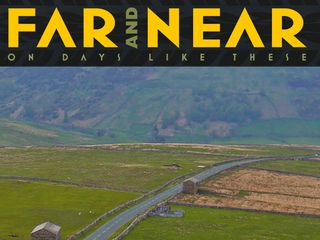
Neil Peart’s new book.
You and Kevin J Anderson collaborated on the Clockwork Angels novel. Was that a gratifying experience or so much toil or both?
Working on the novel was fantastic for me. We’ve just finished the graphic novel of it too with a comic book publisher called Boom! Kevin and I didn’t want to leave that universe and he suggested we carry on with a lot of the lesser characters from the novel and flesh out their stories. The next one will be called Clockwork Lives. I’m not done with that project. I think it could be an opera in the classic sense; that would be fantastic.
You write constantly, lyrics too: tell us about your ‘scrap yard’.
I collect bits all the time; if I have a nice line that I like, or a possible title then I note that down. Going back over your notes, I call it fishing in the scrap yard: that line goes with that and that could go over there, so much of our stuff has happened like that; I know that the Roll The Bones title had been in my scrap yard for a decade or more.
Your lyrics sound almost fantastical at times, but the reality is that you focus on very universal themes: you write about the everyman much more than you’re given credit for.
I try to find that particular kernel in things, to find the universal. The other day I was thinking about our song Distant Early Warning, which is from… ’83? And I was watching what my friends were going through at the time, work difficulties and marriage difficulties and what the world was going through at the time when the Soviets had just shot down that airliner, and all of that stuff was out there and I wanted it in that song and the little twist in that, the lyric: ‘you sometimes drive me crazy, but I worry about you’, and that is life, you know? That’s one of the few times, out of all the songs that we’ve written, there are only a handful of lines that I could really replicate, you know, endlessly and that’s certainly one of them.
Any others?
Another one is that line from Presto, ‘what a fool I used to be’, because it’s always true, oh, yesterday I was a fool, but not today! That’s a song I would like to play live again; I hope we can someday. I love how we revitalised that song by performing it in front of an audience. There’s another one called Hand Over Fist, which has the same personal and universal elements to it that I would really love to revive, because we’ve always said that if we could remake one album, an album that could have been so much better, where the songs are so much better than the record is, then Presto would probably be the one we would pick.
Two Rush tours feature heavily in the book – Time Machine and Clockwork Angels – were they very different tours?
Undoubtedly so, a different character even. Clockwork Angels was just so satisfying on so many levels, the music we were presenting and the way we felt we were playing as a band, the way it was happening, having the string players. Socially, I think people can forget the day to day of our lives: these new people came into our world and every day soundcheck would end with us going back to talk to them for a while, so that was a very fresh shot of novelty and enjoyment for us and entertainment, just the hanging out.
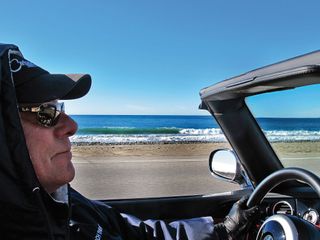
On The Road Again: Peart in his element. Credit: Neil Peart
So you still miss touring with other people?
We used to have that with opening acts, you know? Someone sent me a picture of us with UFO the other day and we got very tight with them when they opened for us, musically and personally, it was really a treat. It was a good decision we needed to make to go on our own without an opening act, but I miss that part if it: I miss the socialising.
There are still no Rush dates confirmed yet – Alex suggested there might be, Ged wasn’t so sure – but where do you stand on touring now? Does the idea of it still enthral you, or leave you cold?
It’s a true dilemma, there’s no right answer. People say to me, ‘Are you still excited when you go out on tour?’ Should I be excited about leaving my family? No, and no one should. It’s as simple as that: if you put aside the fantasy of it, it is what it is and has to be done, and that’s fine and I pour my entire energy and enthusiasm into it, but, of course, I’m of two minds about the whole idea.
Your write very lovingly about your daughter Olivia in the book: how old is she now?
She’s five and again with the separation, it’s heartbreak, I’ve been doing this for 40 years, I know how to compartmentalise, and I can stand missing her, but I can’t stand her missing me and it’s painful and impossible to understand for her. How can a small child process that? And there’s the guilt that comes with that, you feel guilty about it, of course. I’m causing pain.
But part of you still yearns to perform?
Me, Ged and Alex all met together about a month ago now. I was in Toronto and we all got together and discussed things and playing was the activity that we all most wanted to do, though we’ve made no real decisions yet. We’re all in our sixties and we did feel that with Clockwork Angels live we reached a prime that we’re all very proud of and pleased with, but that is the hardest thing by far, performing. You can fiddle around in the studio until your dotage, but as far as going out there and playing, especially drumming, for me it’s such an athletic undertaking, we really want to utilise that while we still have it.
ENTRE NOUS
_From jamming with The Who to discussing the best wine you can buy for £50, to revealing just how good Alex is at golf and pondering whether there’ll be another Rush album, Geddy Lee gets up close and personal with Phil Wilding…
_
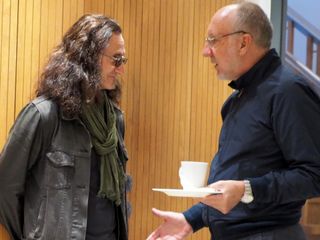
Geddy Lee keeps his cool chatting with Pete Townshend. Credit: Getty
Home in Toronto after a fleeting visit to London to perform both bass and vocals on just one song with The Who band for the Teenage Cancer Trust at the Shepherd’s Bush Empire alongside artists like Liam Gallagher, Joe Elliott and Eddie Vedder, Geddy Lee is in remarkably good form. He’s dodged jetlag, though he’s no idea how, and is enjoying being home and becoming a grandfather for the first time. When Prog calls he’s sitting by the window in his studio studying the clouds looming in over the city. ‘I think,” he says, “It looks like snow.”
You recently played live for the first time in a long time with The Who band backing you up for The Who Hits 50 show. You cite Live At Leeds as one of your favourite albums: how nerve-wracking/exciting was it playing The Seeker with them?
Well, I admit that I was a little nervous walking in to the rehearsals as being in Rush is a kind of insular existence, but from the moment I arrived I was so welcomed and well treated by the band and crew that I relaxed right away and just did my thing…
It was the second time you met Pete Townshend – the first was when you picked up the Governor General’s Arts Award in Canada – is it ever easy meeting your heroes, even as a rock star?
Well, it’s always a little awkward meeting someone whose music has been such a huge inspiration on you for so long, no matter how much success you’ve had in your life. But you also have the confidence of that success behind you which really helps normalise those situations.
Talking of heroes, you also talk about Cream as being one of the most influential bands on Rush. You saw them as a young man – how influential on you were they?
Cream and The Who were the two biggest influences on me and my playing and writing from the earliest days playing high schools, and drop in centres. In our earliest form of a band we played Spoonful by Cream, which was our “big number” and basically just tried to imitate the guitar and bass parts.
You’re a huge baseball fan – with the Toronto Blue Jays breaking your heart almost every season – and got to throw the first pitch out at a home game a few seasons ago: how did that feel?
Well, yes, I love baseball as is well documented and the last two seasons have had their ups and downs, but in the end have been disappointing. Throwing out the first pitch two years ago was a blast. I practiced so much and took it very seriously and was very relieved that I threw a good strike over the plate. My friends and family were even more relieved I think, ha!
You have an envious baseball collection and now a bass guitar collection, too; it’s like picking favourite children, but which one were you most excited to land?
Well, the instruments are really quite inspirational to collect, as there is no more appropriate thing for a musician to collect, is there? There are quite a few of them that I have been really happy to acquire, but I think purchasing Bob Daisley’s 1992 Tony Zemaitis Custom Bass from him was quite a cool thing. There are so few of them and getting one from his well-known collection and getting to know him a bit through our communications was very cool as well.
We’ve got a £50 to spend. What one bottle of wine should we go with? Not to collect, but to drink, and why?
That’s a good question and of course it depends on your taste, but for a red wine, and for my tastes, I would try and purchase a good Beaujolais Cru from Lapierre or Foillard, great food-friendly wines and reasonable too. For a white I would look for a nice Sancerre from Francois Cotat.
How good is Alex Lifeson at golf, really? Jerry Cantrell said Alex was good, but that Alice Cooper is awesome in comparison. We’re not sure if that’s a compliment or not. And what about his prowess as a painter?
[Laughs] He is really quite good and he should be as he spends enough time at it! But I’ve never played with Alice so you’ll have to take Jerry’s word for it. He is an exceptional artist as well, a really talented guy. Who knew?
Neil says that one of the best things about having the string section on the Clockwork Angels tour was the camaraderie of other musicians on tour and it was like the days of playing with UFO and Primus. Do you miss having support bands to hang out with?
Well, It was fantastic to have such a variety of personalities along for the Clockwork Angels tour, really great players and lovely people, and a few have become pals. But as for an opening act, no, I don’t miss having that because we get to play a longer show and start earlier and the show is the whole reason for putting up with all the travel in the end.
Clockwork Angels the album was such a high watermark creatively, that it could be argued (by an idiot) that it’s a great album for Rush to go out on. Are there any Rush albums left in you or is that an impossible question for you to answer?
I certainly believe we have enough mojo to do another really good record and I still love to play and write, but that’s something that I’m afraid only time will tell.
